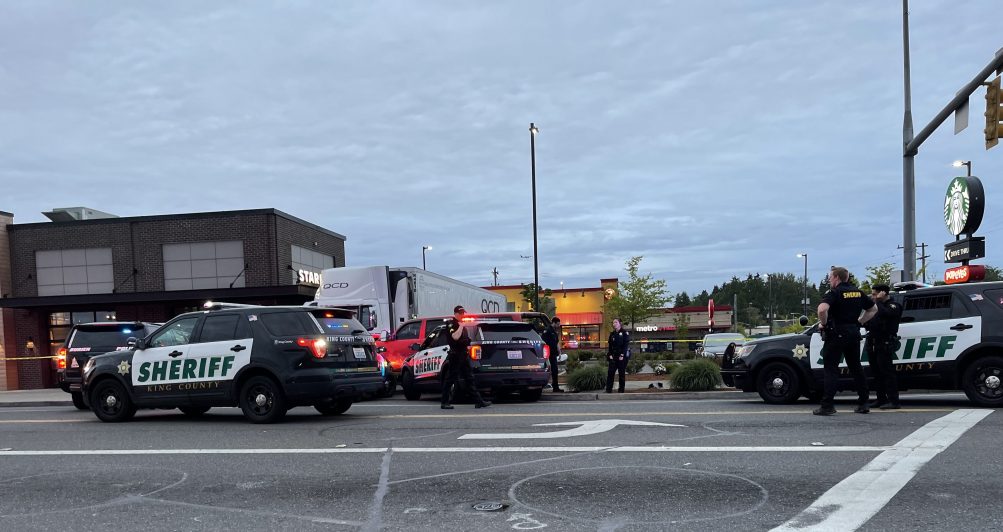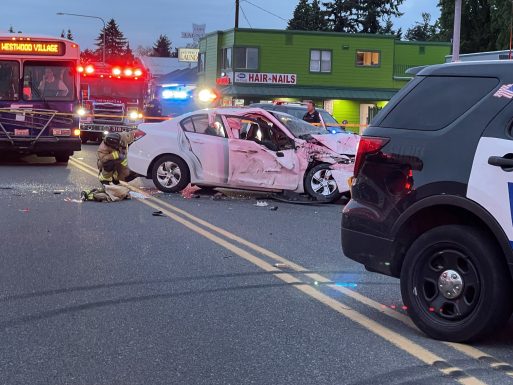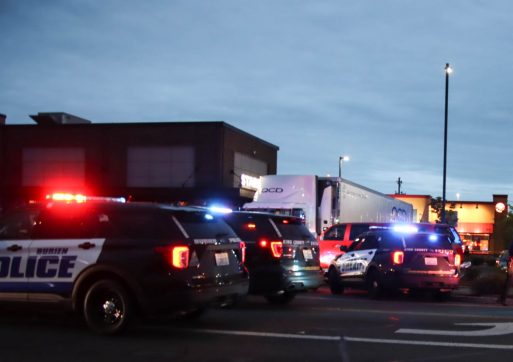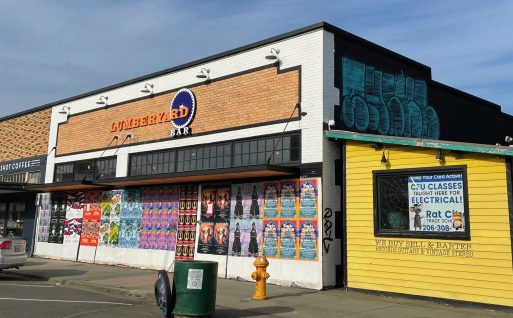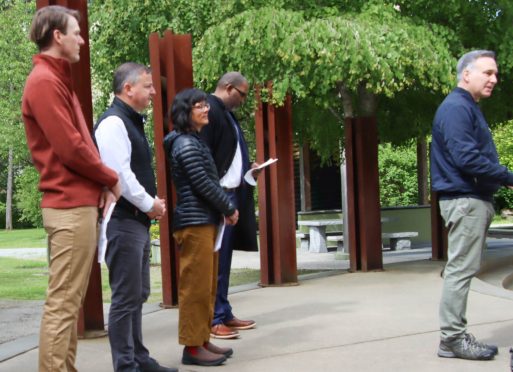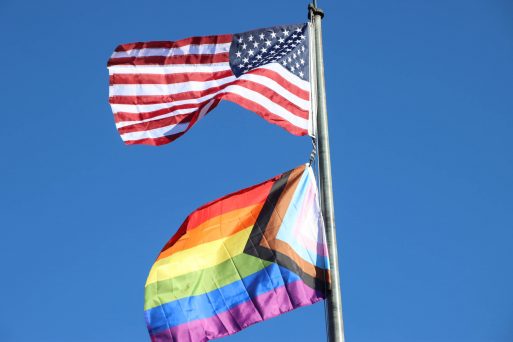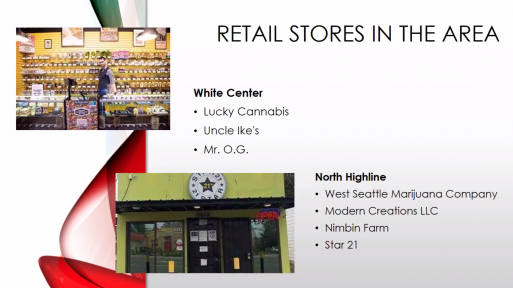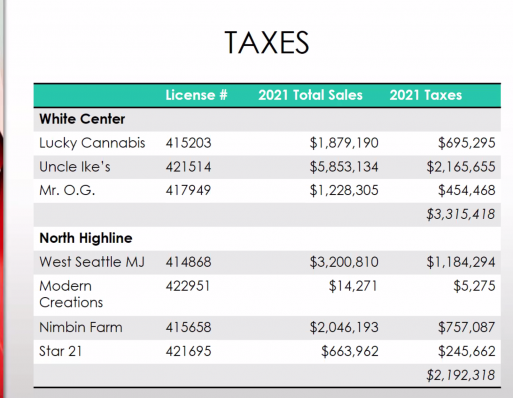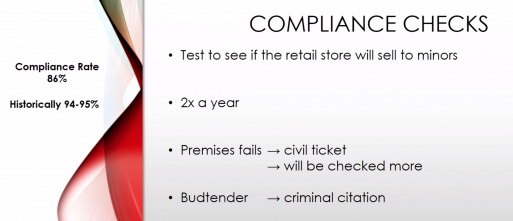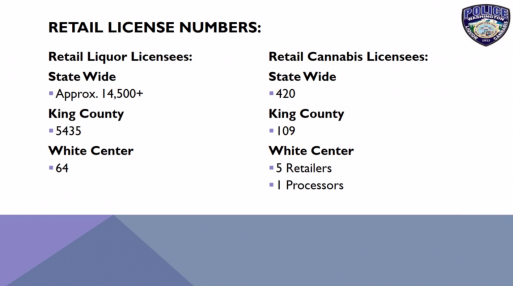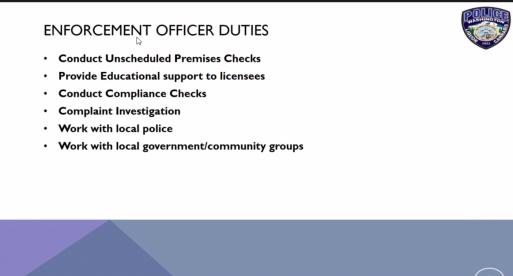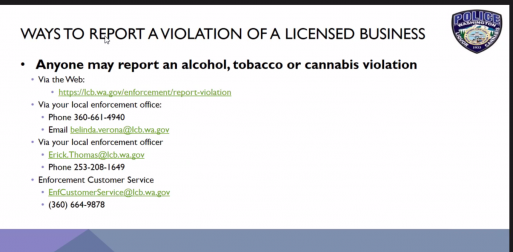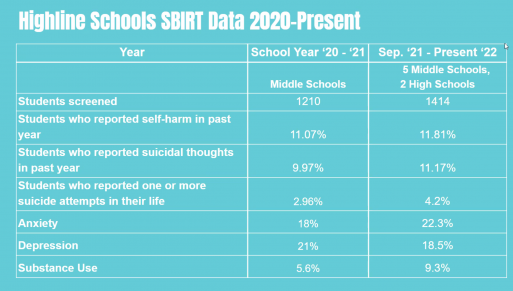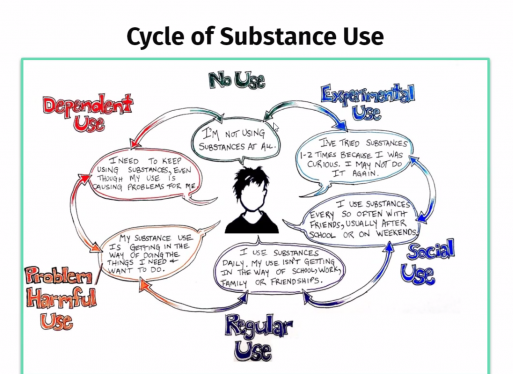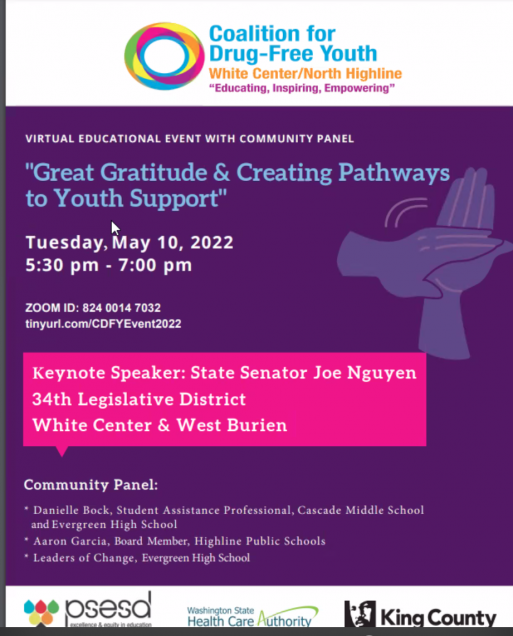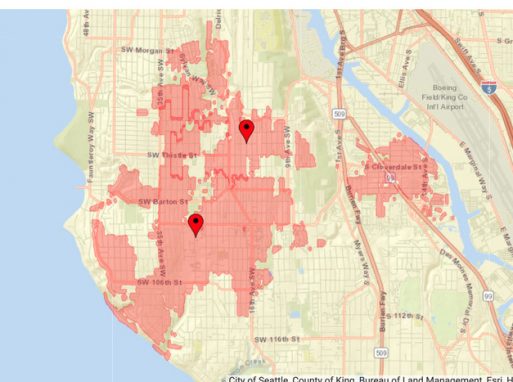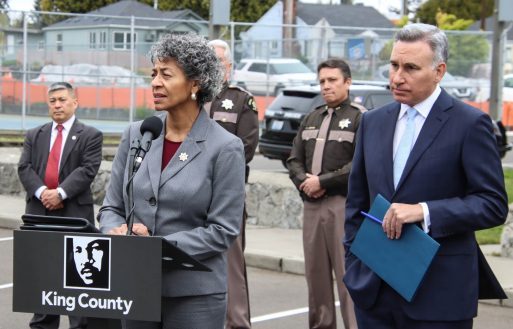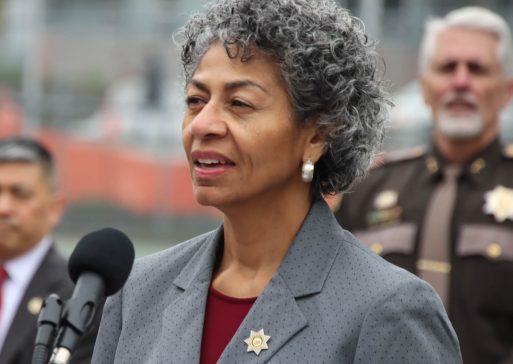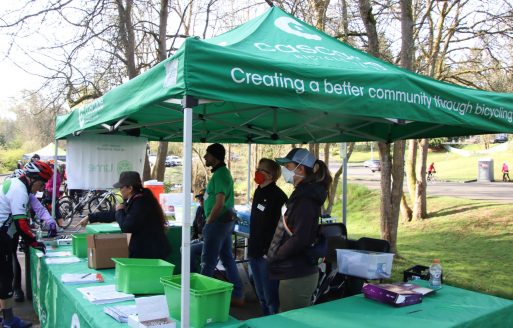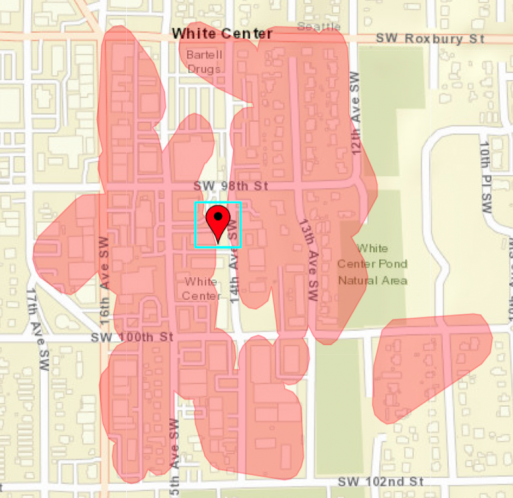
 The fields are set for the August primary. The marquee local race in our area this time around will be for 34th District State House Position 1, from which Rep. Eileen Cody is retiring after more than a quarter-century. The first debate/forum in the race is tonight (May 26th), 6:30 pm online, with the 34th District Democrats and West Seattle Democratic Women hosting the two Democrats who are running, Emily Alvarado (left) and Leah Griffin (right). 34th DDs chair Carla Rogers says all are welcome to attend; register here to get the link. In addition to being a public forum, this also is a prelude to the 34th DDs’ endorsement meeting, which Rogers says is set for June 8th.
The fields are set for the August primary. The marquee local race in our area this time around will be for 34th District State House Position 1, from which Rep. Eileen Cody is retiring after more than a quarter-century. The first debate/forum in the race is tonight (May 26th), 6:30 pm online, with the 34th District Democrats and West Seattle Democratic Women hosting the two Democrats who are running, Emily Alvarado (left) and Leah Griffin (right). 34th DDs chair Carla Rogers says all are welcome to attend; register here to get the link. In addition to being a public forum, this also is a prelude to the 34th DDs’ endorsement meeting, which Rogers says is set for June 8th.
ELECTION 2022: 34th District State House contenders debate tonight
May 26th, 2022 at 1:24 am Posted in Politics, White Center news | Comments Off on ELECTION 2022: 34th District State House contenders debate tonight
UPDATE: Crashes in White Center after King County Sheriff’s Office pursuit
May 24th, 2022 at 8:28 pm Posted in Crime, King County Sheriff's Office, White Center news | 6 Comments »
8:28 PM: This is just developing now along 16th SW in White Center – according to emergency-radio traffic, King County Sheriff’s Deputies were pursuing a vehicle (we don’t yet know why) and, after use of the PIT maneuver, it ended with collisions reported on 16th SW – one around SW 104th and another around SW 100th. We’re on our way to find out more. In the meantime, if you have to go through White Center, avoid that stretch of street.
8:44 PM: Photo above is from the scene at 16th/100th. Road closures start there/southward. So far, we’ve learned only that this began with an incident in SeaTac. A suspect is in custody. Major Crimes detectives are responding, so this will be an active scene for some time.
9:17 PM: Added photo from 104th scene. Deputies at the scenes aren’t commenting but we just talked by phone with KCSO Capt. Tim Meyer. He says they started chasing the suspect as a “followup to an open and active investigation from a couple days ago” and that the 104th collision happened during the pursuit, with the suspect’s vehicle coming to a stop at the WC Starbucks. Capt. Meyer said two people were taken to hospitals – one to St. Anne in Burien, one to Harborview Medical Center.
9:54 PM: Going back through archived radio exchanges from the start of the pursuit, the only additional detail we can deduce is that the red pickup truck (partly seen in the photo above) is what the suspect was in, and that the deputy who started trying to pull him over recognized him from a “bulletin” that had been circulated regarding the earlier case.
FOLLOWUP: New location for the Lumber Yard Bar close to opening
May 23rd, 2022 at 11:45 am Posted in Beverages, Businesses, White Center news | 1 Comment »
You have probably noticed the sign is now up at the new location of the Lumber Yard Bar in downtown White Center, almost 11 months after the fire across the street that gutted the original location and other businesses. So we checked in with the proprietors to see how soon they expect to open the new location (9630 16th SW). Reply: “We are hoping to open late next month.”
VIDEO: King County Executive comes to White Center to announce land-conservation ballot measure
May 19th, 2022 at 11:56 pm Posted in Election, Environment, King County, White Center news | 1 Comment »
(Also published on partner site West Seattle Blog)
$1.81 a month to raise more money to save the “last, best” green spaces from disappearing.
That’s what King County Executive Dow Constantine is proposing charging property owners in a ballot measure he announced at White Center Heights Park.
The cost, Constantine says, is what the owner of a “median-priced” home in King County would pay if voters approve the measure, which he is asking the County Council to place on the November general-election ballot.
Even at that, he says, it’s not an entirely new tax – he says it would bring back what property owners used to pay for the half-century-old Conservation Futures Program. The announcement explains:
Land conservation in King County – and 13 other counties – is largely funded by the Conservation Futures program that the state created 50 years ago. A series of actions by the state has dramatically reduced the amount of revenue that the program can generate for counties. Voters have the option to restore the local program to its original rate of 6.25 cents per $1,000 of assessed property value from its current rate of 3.12 cents. That would cost the owner of a median-value home about $21.75 more per year.
Constantine was joined at the park – setting of other media events for environmental programs – by De’Sean Quinn, the Tukwila City Councilmember who co-chairs the Land Conservation Advisory Committee, as well as Open Space Equity Cabinet co-chair Michelle Benetua, Trust for Public Land’s Northwest director David Patton, and King County Councilmember Rod Dembowski. Here’s our video of what they said:
The money raised by this would, according to the announcement, “accelerate the Land Conservation Initiative, a regional partnership of communities, cities, farmers, businesses, and environmental leaders to protect 65,000 acres of the highest conservation-value open space.” Constantine launched the initiative three years ago. The land it’s saved includes a five-acre site in North Highline. That’s one of the sites intended to bring public green space closer to more people; Constantine said that 20 percent of the people in King County don’t live close to any. It’s about equitable access, climate change, wildlife protection, and more, he said while making the case. Quinn lauded him for the “political will” to push for this “to meet the urgency of now.”
WHAT’S NEXT: Dembowski, who chairs the Transportation, Economy, and Environment Committee, will sponsor the proposal. Councilmembers have until late July to approve sending it to the November ballot. Meantime, the Land Conservation Initiative continues working on potential sites to protect – not only via buying them; sometimes other tools are used, such as conservation easements, or the purchase of development rights, to take the pressure off property owners. Constantine said they can’t comment on what’s in negotiations or under consideration, for obvious reasons.
WHITE CENTER PRIDE 2022: More info about this year’s celebration
May 18th, 2022 at 6:09 pm Posted in Fun, People, White Center news | 1 Comment »
The street festival noted here earlier this week isn’t all that will comprise this year’s White Center Pride celebration. Here’s the full announcement received today from organizers:
Coming in June, White Center Pride organization proudly announces a series of events in the White Center neighborhood that celebrates the lesbian, gay, bisexual, transgender, queer, intersex, asexual, and all sexual and gender minority (LGBTQIA+) people. This first in-person Pride following the arson fires and vandalisms from 2021 intends to bring people together to heal in solidarity over the triumphs and sacrifices made by the LGBTQIA+ and ally community.
Beginning on Wednesday, June 1st, at 6:30 pm, White Center will kickoff this year’s Pride events with an opening celebration at Triangle Park. Special guest speakers, performances, and music will lead up to the raising of the Progressive Flag above the heart of White Center. Immediately following the Flag Raising Ceremony, the Southgate Roller Rink will host Pride Skate at 8:30 pm, where skaters can glide and dance to the theme “GLOW UP: Light up for Pride” with DJ Redline. This popular event is an opportunity for members of the queer community to express their diverse and unique selves in an inclusive and groovy space.
On the following day, Thursday, June 2nd, in collaboration with the White Center Pride organization, Future Primitive Brewery will release their limited edition “Queer Beer” for the second year, with part of the proceeds supporting the White Center Pride Organization. Jason Loughridge, President of the White Center Pride organization, invites attendees to “Come raise a glass with us, as we celebrate diversity, equity, and inclusion in the White Center neighborhood. Additionally, if you are interested in learning about the beer making process, join us at 5:30 pm for a brewery tour before the official Queer Beer release later in the evening.”
It all leads up to the main event on Saturday, June 11th starting at noon: a day of fun and celebration at the White Center Pride Street Festival in Downtown White Center. Closing down the main “drag” on SW 16th Ave and south of SW Roxbury St for pedestrian traffic only, you can stroll the streets safely and enjoy queer vendors, drag performances, live music, beer gardens, and more!
Nathan Adams, owner of the Lumberyard, sums up the spirit of this year’s White Center Pride: “Pride in knowing one’s self should be celebrated every day. The journey is a long one and only each individual can know when it has started or is complete. Our strength comes from ourcommunity and our family, and together we can all be proud of who we are, where we come from, and where we call home!! This community is more like family to myself and everyone at the Lumberyard, and we cannot wait to celebrate and open our doors for our family.”
For a list of White Center Pride events, see the organization’s website at whitecenterpride.org/2022-schedule.
“On behalf of the White Center Pride organization and the White Center neighborhood, we invite you to our pride events. Celebrate the spirit of personal discovery and authenticity together!”, said Matt Maring, Fundraiser Chair of the White Center Pride organization.
It’s your money – help decide how it’s spent!
May 17th, 2022 at 11:56 pm Posted in King County, White Center news | Comments Off on It’s your money – help decide how it’s spent!
Time for the next step in participatory budgeting! Here’s the announcement:
King County is holding a pair of meetings on the dozens of project ideas it received via its Participatory Budgeting process. The meetings will help prepare residents for the larger “Community Vote” scheduled for June, when they will vote on which projects receive funding.
Nearly a year after King County embarked on a new process that gives communities the power to choose how money is invested in their neighborhoods, residents will get the chance to learn about the community projects that could come to their areas.
The Community Investment Budgeting Committee, the group of residents from King County’s urban unincorporated areas that created the framework for the new Participatory Budgeting process, will lead a pair of virtual Project Expo Community Meetings on May 23-24.
Those who attend these online meetings will learn about the dozens of project ideas that were submitted by the public earlier this year. Both meetings are scheduled from 5-7 p.m., and take place via Zoom:
Skyway and White Center/North Highline areas: May 23
East Federal Way, East Renton and Fairwood areas: May 24For Zoom login and for more information, please visit www.publicinput.com/yourvoiceyourchoice.
These meetings will prepare residents for when they will get to vote on which projects will receive funding during a “Community Vote” scheduled for June. Details on the public vote will emerge in the coming weeks.
“It has been really exciting to work with new community leaders throughout unincorporate King County,” Participatory Budgeting Program Manager Gloria Briggs said. “I am truly proud of the community-led process we have built, and to think we did it all virtually! Participatory budgeting is a transformative process that will be impactful in our communities and the future of unincorporated King County.”
Shaping the framework
Briggs says it’s remarkable the program has the point where it’s presenting project ideas and preparing for the community to vote on them, given the county’s Participatory Budgeting process isn’t even a year old.
The Community Investment Budget Committee (the group of community members who are guiding participatory budgeting in unincorporated King County) is now in its proposal development phase.
The committee is working with more than 40 community members to rate and prioritize ideas submitted by the public earlier this year and turn them into project proposals. These project proposals will be shared with the public and placed on a ballot. Then community members will vote in June on which project proposals to fund.
To date, it’s received an assortment of project ideas, including requests for sidewalks, community art, community gardens (see photo), and various youth programs.
Work to date
In 2020, the King County Council approved a new approach to community investment – one that’s centered on racial equity. It aimed to give people who live, work, play and worship in the county’s five unincorporated areas the chance to choose how $10 million is spent. Below is a timeline:
June 2021: Convened 21-member steering committee
December 2021: Completed design of the participatory budgeting process in selected unincorporated areas of King County.
February 2022: Community submitted ideas on how to spend monies
March 2022: The program identifies 40 community volunteers commit to serve as “Proposal Advocates” to help build selected ideas into detailed proposals that will go to ballot for community voteMore on Participatory Budgeting
Participatory budgeting allows communities to identify, discuss, and prioritize public spending projects. Residents can help decide how to spend money on capital projects (physical things that are bought, built, installed, and/or fixed up), programs and services.
King County approved funding for this program in its current two-year (2021-2022) budget:
Skyway/West Hill: $3.9 million for capital projects, $810,000 for services and programs
North Highline/White Center: $3.1 million for capital projects, $540,000 for services and programs
East Federal Way: $1.96 million for capital projects
East Renton: $301,000 for capital projects
Fairwood: $720,000 for capital projectsThe Community Investment Budget Committee developed the participatory budget process in urban unincorporated King County. This marks the first time King County has used this community drive approach for its unincorporated areas.
Participatory budgeting has five phases: developing the rules, brainstorming ideas (February), developing ideas into project proposals (March-May), voting (June), and funding winning projects (June and onward). Your participation will make all the difference!
Who can participate? Anyone at least 12 years old who lives, works, owns a business, receives services, goes to school, or worships in any of the areas above.
Where does the money come from? The funds for the capital projects will be backed by bonds. The funds for services and programs in North Highline/White Center and Skyway-West Hill come from King County’s general fund and are supported by marijuana retail sales tax revenue.
How can I learn more? The best way to get information about participatory budgeting is to visit www.publicinput.com/yourvoiceyourchoice. You can find information on upcoming sessions, get information on the participatory budgeting process and more.
Full Tilt Ice Cream announces flavor for fight to save reproductive rights
May 16th, 2022 at 9:47 pm Posted in Full Tilt Ice Cream, White Center news | Comments Off on Full Tilt Ice Cream announces flavor for fight to save reproductive rights
From White Center-founded Full Tilt Ice Cream:
Full Tilt Ice Cream today announced Stout Your Abortion, a new flavor to support SYA. shoutyourabortion.com. Stout Your Abortion is a stout ice cream with chocolate flakes and benefits SYA.
“The SCOTUS has become a political weapon that is now being used to suppress and control people with vaginas.” says Justin, owner at Full Tilt. “This ice cream isn’t going to change anything, but hopefully it raises awareness.”
To celebrate the release of this flavor, there is a launch party on Friday the 20th of May at the White Center location, starting at 4 pm.
Stout Your Abortion will be available starting 5/20/2022 at all Full Tilt locations.
The White Center shop is at 9629 16th SW.
White Center Pride Block Party less than 4 weeks away!
May 15th, 2022 at 11:17 pm Posted in Fun, White Center news | Comments Off on White Center Pride Block Party less than 4 weeks away!
Is your calendar set for this?
SATURDAY: 300 garage/yard/alley/block sales ‘next door’
May 13th, 2022 at 8:02 pm Posted in West Seattle, White Center news | Comments Off on SATURDAY: 300 garage/yard/alley/block sales ‘next door’
Been a little quiet over here as we work on the biggest project of the year over on partner site West Seattle Blog – we are the coordinators of the annual (except for the pandemic hiatus) West Seattle Community Garage Sale Day. Tomorrow (Saturday, May 14th, 9 am-3 pm) is the big day, and we wanted to invite everyone. If you’re interested in shopping, find the map and list here.
What you might not know about the cannabis business, and how it’s regulated, @ North Highline Unincorporated Area Council’s May meeting
May 5th, 2022 at 8:47 pm Posted in North Highline UAC, White Center news | 2 Comments »
By Tracy Record
White Center Now editor
The cannabis business and how it’s regulated comprised the spotlight topic at tonight’s May meeting of the North Highline Unincorporated Area Council. Here’s what happened:
STATE LIQUOR AND CANNABIS BOARD: Lt. EP Hackenberg handles this region. He noted that there are seven stores in the White Center/North Highline area.
He showed the income and taxes paid by just those seven stores – public information by terms of the measure that legalized cannabis – $5.5 million in taxes last year alone:
There were two processing facilities during the year – West Coast Premium Products and Kush Mountain Gardens – but Lt. Hackenberg wasn’t sure if they are still in operation. Their “tax footprint” is/was negligible, though.
One big task for his agency, compliance checks:
So far this year they’re at 86 percent compliance, but historically it’s been more like 95 percent. He also acknowledged the recent robberies targeting cannabis retailers – including ones that resulted in three deaths, one budtender, two robbers – and said they offer safety tips to shops. (That advice is available on the LCB website.) He clarified that his agency is not a primary law-enforcement agency so they don’t respond to or investigate crimes like these – local law enforcement does. Then he added that there’s one thing his agency has in common with local law enforcement – they’re hiring.
In Q&A, NHUAC’s Liz Giba wondered if safety measures would be codified/regulated, or just left up to stores. For one, they are required to have cameras, Lt. Hackenberg said, but he hasn’t seen any evidence that anything else will be required. “We want to give them options for how they can be safer in running their business.” NHUAC’s Barbara Dobkin asked if he had any data on store holdups and other crimes in this area. He didn’t have a specific NH breakdown. And there have been different robbery groups/individuals – it’s not just one group responsible for all.
Next up was Officer Erick Thomas from the LCB. He was there to talk about the education/enforcement division. He showed the numbers for liquor and cannabis businesses – the former far outnumber the latter:
The White Center area is in the jurisdiction of one of the 15 statewide cannabis-enforcement officers – he is that one right now, responsible for 285 licensed locations – and one of the 48 retail-liquor enforcement officers, who has 127 licensed locations to keep tabs on. Discussion with him clarified that there are five operating marijuana stores, and one processor, in the White Center/Top Hat area. WALCB also has “compliance consultants,” two of whom work in King County. Here’s what officers like him do:
He said they check 7 locations a month, and location often helps determine the priority – a store not far from a school, for example, woudd be a high priority. If he gets a complaint about a business, he has 60 days to investigate. He also does “closing checks” during regularly scheduled night shifts each month. The division also spends many hours on education, “We put a large focus on education as part of enforcement.”
Want to file a complaint? You can do that online. You can do it anonymously but as an officer, he prefers to be able to talk with the complainant, to get more detail. If he knows who the complainant is, he can circle around and explain how the investigation turned out.
In Q/A, Officer Thomas was asked about the plans for a menthol-cigarette ban. He said he does not expect that to be a problem – they managed to handle the flavored-vape ban, and this is likely to be similar. Next question: Say you get a complaint about a bar serving minors. How do you investigate? That will often lead to a compliance check, or even surveillance, if he has information on a specific employee and a specific time of day. He investigated that kind of complaint in North Highline in 2020 and that generated a violation, which can result in a $500 fine or a multi-day license suspension. He said the business failed multiple compliance checks and could have lost their license; instead, they sold the business, and now there is a new licensee in the same location that has passed its checks.
What about hookah lounges? asked NHUAC’s Pat Price. The one that’s been the site of some issues in the area is on their radar, Officer Thomas said. They “continue to work” that spot, he said. He also noted the Taradise Café situation, in which “many agencies” were involved, the county found a violation that closed it, and all that unfolded before its proprietor’s untimely death; now the building is in different hands. He also was asked about the unlicensed cannabis stores in White Center in the past; WALCB was involved in that. Two different owners. two raids, the second one was King County-led, he said. They got a tobacco license, applied for a liquor license, but that didn’t work out when an investigation revealed ties to past ownership. Overall, Thomas said, they work rather stealthily – no uniforms, no marked cars, “you don’t see us around .. a lot of times customers, employees don’t even know we’re in there observing operations.”
Overall, “we want successful retail operations in our community,” Thomas underscored.
Do they get many complaints? They’re starting to ramp up, but less than a dozen so far this year. He added later in the meeting that he had just done compliance checks and six out of seven went well.
King County Sheriff’s Deputy Bill Kennamer, a regular guest, couldn’t attend the meeting, but NHUAC did also hear from Marissa Jauregui, who coordinates the local Coalition for Drug-Free Youth. She talked about youth trends and said her organization works with Cascade Middle School and Evergreen High School, and has worked in the White Center area for a decade.
Seeing family and/or friends use substances influences young people’s choices, she noted. She also showed results of a survey showing that substance use is up among local youth in the past year:
Why are they using? Many reasons:
Understanding is vital when approaching conversations about this with youth. She also talked about the physical facts of dependence and addiction. Cannabis is becoming “more commonly used about youth people …. (because of) a misperception that you can’t become addicted.” Smoking, vaping, and dabbing are the most common ways youth use cannabis. It affects memory, learning, sports performance, even a risk of psychosis and schizophrenia with heavier use. Regarding alcohol, memory and learning are affected, and in this case, the younger you start drinking, the more likely you are to become dependent. And then there’s nicotine – something that youth start using without knowing much about it, and then they unwittingly become dependent. It’s often used in vaping – with a lot of other dangerous mystery chemicals.
She also mentioned fentanyl since there was a recent discovery of cannabis laced with it – you might ingest it unknowingly, but “the risk of overdose is strong.” It’s also showing up in pills.
When does the coalition meet? she was asked. There is a big event next Tuesday, online:
ANNOUNCEMENTS: Price noted that the White Center Library is open again and trying to rebuild attendance, and the White Center Library Guild is looking for new members (watch for more on that soon). The guild will have its sidewalk sale at the library July 15th and 17th. … Inbetween, on July 16th, the White Center Kiwanis will host its pancake breakfast at the WC Eagles HQ, 8 am-noon … Giba also reminded everyone that the King County Council continues working through the North Highline Subarea Plan (among other planning matters) and that she encourages attendance at the May 24th and June 28th meetings, online, 9:30 am.
NEXT NHUAC MEETING: 7 pm June 2nd, online, before summer hiatus.
UPDATE: Power outage in White Center, South Park, West Seattle
May 5th, 2022 at 1:04 pm Posted in South Park, Utilities, West Seattle, White Center news | Comments Off on UPDATE: Power outage in White Center, South Park, West Seattle
1:04 PM: Big power outage affecting parts of White Center as well as South Park and West Seattle – more than 14,000 customers, according to Seattle City Light. Under investigation is a report that this might have been caused by a tree being cut and falling onto wires in central Delridge.
2:15 PM: About a third of the originally affected customers are back on, including South Park and parts of West Seattle. SCL has in the meantime confirmed that a tree is to blame, and says it took out “two feeders,” which is why this was such a large outage.
2:21 PM: And as we typed that, most of the rest of the outage zone was restored – now down to fewer than 400 customers.
VIDEO: Interim Sheriff Patti Cole-Tindall nominated for permanent job
May 3rd, 2022 at 11:22 am Posted in King County Sheriff's Office, White Center news | 1 Comment »
11:22 AM: In the parking lot at Steve Cox Memorial Park this past hour, both King County Executive Dow Constantine and his newly announced nominee for Sheriff, Patti Cole-Tindall, paid homage to the park’s namesake as someone who embodied community service. Cole-Tindall, who’s been serving as interim sheriff since the start of the year, promised to carry on that tradition. We were there as both spoke with the media, and we’ll have the full story plus video later today.
ADDED 12:15 PM: Constantine declared, “I think we have found the right person to lead the King County Sheriff’s Office.” He noted that he chose Cole-Tindall – who joined KCSO seven years ago – from what started as a field of 12 candidates, narrowed to 3 finalists (the other two were from out of state). He believes she’ll “chart a new course” as an “effective leader for change,” especially given her background in roles including the Office of Law Enforcement Oversight. Here’s how he introduced her:
Cole-Tindall acknowledged she isn’t and won’t be “a traditional sheriff.” She again mentioned Deputy Cox, saying he “loved this community and they loved him back.” We asked her about specific plans for the unincorporated communities such as White Center/North Highline, and she said one idea is to create “community councils/action committees” to “hear directly from folks (and) engage with the community.” Engagement, she says, is what she heard the most about from members of the public during the hiring process.
Another of her top priorities will be to restructure the Sheriff’s Office. Right now, for example, it has only three divisions, in some cases ‘mash(ing) together” unrelated responsibilities. No job loss, she promised. And she wants to work on both employee retention and hiring incentives, as KCSO copes with a staffing shortage like that plaguing so many departments around the nation. Here are her full remarks:
Cole-Tindall’s most-recent role in KCSO before interim sheriff was as undersheriff. The County Council considers her nomination on May 18th and Constantine says he’s hoping for a final vote by month’s end. Meantime, it’s been noted that since Cole-Tindall hasn’t been serving as a certified officer in recent years, she’ll have to go back to the academy, an almost five-month-long process, no later than January. While she’s there, “an acting Sheriff from the KCSO leadership team willl be appointed,” today’s announcement says.
New King County Sheriff to be announced Tuesday in White Center
May 2nd, 2022 at 2:14 pm Posted in King County Sheriff's Office, White Center news | Comments Off on New King County Sheriff to be announced Tuesday in White Center
King County Executive Dow Constantine says he’s made his decision on who he’d like to hire as the next sheriff, and will introduce his nominee to the media tomorrow morning at White Center’s Steve Cox Memorial Park. Three people were identified as finalists for the job, which is now an appointed rather than elected position: Patti Cole-Tindall, Interim Sheriff; Charles Kimble, Chief of Police, Killeen, Texas; Reginald Moorman, Major, Atlanta, Georgia Police.
Cannabis in the spotlight at North Highline Unincorporated Area Council’s May meeting
April 30th, 2022 at 11:56 pm Posted in North Highline UAC, White Center news | 1 Comment »
Next chance to connect with your community council is this Thursday – here’s the announcement:
The Opportunity to Be Informed, Be Involved and Be Heard!
Where? North Highline Unincorporated Area Council Meeting
When? Thursday, May 5, 2022, at 7 pm
Join Zoom Meeting
us02web.zoom.us/j/86184303928?pwd=VFNRSEtQVHhNMTVzTUZiWXFtYWo5QT09
Meeting ID 861 8430 3928
Passcode: NHUAC2022 (Case Sensitive)Unable to join via Zoom? Please call 253-215-8782
Meeting ID: 861 8430 3928
Passcode: 538997120* * * * * * * * * * * * * *
White Center has a colorful history. “During the Prohibition years (1916-1933), the trade was bootleg liquor. Some members of local law enforcement were in on the smuggling.’ After Prohibition ended in 1933, bars and restaurants that serve alcohol became a significant part of White Center’s legal business community. White Center — Thumbnail History – HistoryLink.org
The legalization of alcohol put the newly formed Federal Bureau of Narcotics at risk. It needed something to prohibit. Cannabis was chosen for a number of reasons, including money. Companies such as DuPont and Ford feared competition from products that might be produced from hemp. Racism was another motivator. The ”name…’marihuana” painted cannabis as foreign and dangerously exotic, making it seem as though the criminalization of marijuana was necessary to keep the country safe.” The History of U.S. Marijuana Prohibition – CNBS
In 2012, Washington voters legalized the recreational use and sale of marijuana. Since legalization, cannabis shops have become a substantial part of the community. With them came tax dollars and concerns ranging from the effect of such an abundance of these businesses on our young people to the recent rise in robberies of cannabis shops.
In 2015, the Liquor Control Board became the Liquor and Cannabis Board (LCB). So, what is the state of the liquor and cannabis businesses in our community and state? NHUAC will be joined by LCB’s Lieutenant E.P. Hackenberg and Officer Erick Thomas at our May 5th meeting. You may know Officer Thomas. His territory includes North Highline, and he participates in NHUAC and Coalition for Drug-Free Youth meetings. We’ve asked Lieutenant Hackenberg to talk about maintaining safety in cannabis stores and other industry-wide issues. We welcome them both and, of course, Deputy Bill Kennamer!
Knowledge is power.
Learn, share, and help make North Highline a healthier community.
May 5, 2022 at 7 pm – Invite Your Neighbors!
LIBRARIES: Got something overdue? Fresh Start for All will clear late fees as of May 4 and suspend new ones temporarily
April 29th, 2022 at 4:09 pm Posted in Libraries, White Center news | Comments Off on LIBRARIES: Got something overdue? Fresh Start for All will clear late fees as of May 4 and suspend new ones temporarily
Local libraries are offering a break starting next Wednesday to people who owe fines for overdue materials – or who are about to incur them. Here’s the announcement:
On May 4, the King County Library System will clear late fines for all patrons with a new initiative called A Fresh Start for All. This one-time waiver gives patrons a fresh start on their account and enables access to all KCLS materials. A Fresh Start for All was approved by the KCLS Board of Trustees on April 27, 2022.
The coronavirus pandemic placed many hardships on King County communities. To help patrons, KCLS temporarily stopped assessing late fines in March 2020. The System also lifted electronic access on blocked accounts during this time so patrons could still download digital materials.
KCLS will return to pre-pandemic circulation practices on September 15, and will start assessing late fines again at that time. After their accounts have been cleared on May 4, patrons will have until September 15 to return items before late fines resume.
KCLS is also introducing a new automatic renewal service on September 15. KCLS will automatically renew holds for patrons if their items are eligible for renewal. This will allow patrons to keep their materials longer without accruing late fines. Patrons may opt out of this service if they choose to.
Late fines add up when a patron does not return library materials by the due date. Late fines over $25 lead to a blocked account. A blocked account limits access to library services, books and other materials.
Lost fees are different from late fines. If library materials are more than 30 days overdue, they are considered lost. A Fresh Start for All will not apply to these fees; under state law, KCLS cannot waive lost fees. On May 4, the System will begin processing lost fees again. KCLS will mail billing notices to accounts with over $25 in fees. Patrons will have until September 15 to return items or pay fees before accounts are blocked.
TUESDAY: North Highline Subarea Plan and more @ County Council committee
April 25th, 2022 at 9:07 pm Posted in King County, White Center news | 3 Comments »
We’ve been tracking the North Highline Subarea Plan; most recently, the NH Unincorporated Area Council discussed it at this month’s meeting (WCN coverage here), after King County Executive Dow Constantine sent it to the County Council as part of the proposed Comprehensive Plan update. Tomorrow morning, councilmembers’ review gears up with a committee briefing. Here’s the announcement:
On Tuesday, April 26, the Local Services and Land Use Committee will receive a briefing on the Executive’s proposed 2022 Comprehensive Plan update and the 2024 Comprehensive Plan scope of work. The committee meeting is scheduled to begin at 9:30 a.m., and will be held remotely. For information on how to watch the meeting or provide public comment, please visit the website for the Local Services and Land Use Committee. Staff report information for the two items is available here.
2022 Comprehensive Plan Update
On March 31, 2022, the Executive transmitted the proposed 2022 update to the 2016 King County Comprehensive Plan as Proposed Ordinance 2022-0162. The 2022 update includes consideration of the Skyway-West Hill Subarea Plan and North Highline Subarea Plan. The legislation has been referred to the Local Services and Land Use Committee for review over the next several months for potential amendment and recommendation, with final adoption by the full Council anticipated in December 2022. More information about the Council’s review of the proposal can be found on the 2022 Comprehensive Plan website.
2024 Scope of Work
On March 24, 2022, the Executive transmitted to the Council the proposed scope of work for the 2024 Comprehensive Plan as Proposed Motion 2022-0156. The scope of work has been referred to the Local Services and Land Use Committee for review, with final adoption by the full Council in early June 2022. More information about the Council’s review of the proposal can be found on the 2024 Comprehensive Plan website.
VIDEO: Ride for Major Taylor rolls out from White Center
April 25th, 2022 at 2:52 am Posted in How to Help, Sports, White Center news | Comments Off on VIDEO: Ride for Major Taylor rolls out from White Center
Those are some of the riders who left the White Center Bike Playground on Sunday morning to head out on the fundraising Ride for Major Taylor. It was actually two rides – a 63-mile route, with riders heading out as early as 7 am, and a 26-mile route with departures starting at 8:30 am.
The ride raises money to help youth via the Major Taylor Project. The presenting organization, Cascade Bicycle Club, explains it:
Marshall “Major” Taylor was a Black athlete and cycling legend who was one of the greatest bicyclists of his era, setting numerous world records and winning a World Championship–all while battling racism throughout his career from the late 1800s to early 1900s. He was an international superstar whose amazing talents and drive were as well-known in his era as LeBron James or Serena Williams are today.
The Major Taylor Project is a year-round, youth leadership cycling program focused on introducing young adults from underserved communities to the recreation of cycling and creating an inclusive culture of bicycling that will continue to future generations. The Major Taylor Project currently serves schools in the Puget Sound region; Seattle, Tacoma, and Puyallup.
The Major Taylor Project welcomes donations year-round.
NO RAPIDRIDE UNTIL NEXT YEAR: Another schedule change for Metro
April 19th, 2022 at 2:45 pm Posted in Metro, Transportation, White Center news | 2 Comments »
The conversion of Metro Route 120 into RapidRide H Line is being pushed back again. Metro has just announced that instead of launching this fall, the H Line won’t arrive until March 2023: “Unforeseen construction and materials delays from the regional concrete strike that began in early December 2021 have added several months to the original timeline of the RapidRide H Line project.” The announcement adds, “Under the revised implementation schedule, Metro plans to add more daily bus trips to coincide with the launch of the RapidRide service in March 2023, which will then improve frequent service to provide a bus trip in both directions every seven minutes during peak commute times.” Metro says that “approximately 40% of the overall construction work” has been completed so far. The Avalon/35th/Alaska repaving project that SDOT handled was in support of the expected launch. This is the fourth time the launch has been pushed back – the conversion of Route 120 was originally projected for 2019, then that was pushed to 2020, then to 2021, and then a year and a half ago, changed to 2022.
King County Public Health closes Crawfish House
April 18th, 2022 at 10:00 am Posted in Health, Restaurants, White Center news | 1 Comment »
Just announced by Public Health Seattle-King County:
The Crawfish House restaurant at 9826 16th Ave SW was closed by a Public Health food inspector on April 15, 2022 at 5:30 pm due to failure to comply with the following outstanding violations:
Demonstration of knowledge in food safety
Lack of handwashing
Inadequate handwashing facilities
Environmental contamination of foods
Effective pest control
Lack of proper cold holding of foods
Contaminated food contact surfacesThe establishment will be reopened once the inspector confirms that these issues have been resolved.
The restaurant’s overall rating from past inspections is “OK.” You can check for other current closures here.
UPDATE: Balloon blamed for power outage in White Center business district
April 17th, 2022 at 1:06 pm Posted in Utilities, White Center news | Comments Off on UPDATE: Balloon blamed for power outage in White Center business district
1:06 PM: Thanks for the tips. A power outage is affecting much of downtown White Center right now – the Seattle City Light map, shown above, says 268 customers are out. No official word on the cause, but we note a crash was reported around 16th/102nd at the same time this started, so we’re off to check.
1:38 PM: Apparently that was unrelated (and cleared before we arrived). The SCL map now attribute the outage to “balloon.” Meantime, businesses on 16th appear to have power.

